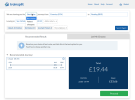I would. Their existence, especially as unregulated fares and as the de facto standard for many journeys, in a system that treats turn up and go tickets as the de jure standard, is at the heart of a lot of the confusion about what restrictions actually mean and hence the disputes that arise.
The problem isn't Advance tickets. As others have said, they're dead simple - valid on this specific train, and this specific train
only. No confusion about route, operator, peak/off peak times. Okay, there
could be an issue of identifying the correct service if you have multiple departures in the same direction in quick succession, or if there a multiple trains to multiple destinations at the same time, but that's far less of an issue, in my experience.
The problem is how online retailers sell Advances.
Take a quick, admittedly not wonderfully scientific, survey of 5 online retailers/apps - Trainline, TrainPal, Uber, Northern and RailUK.
Of those 5, the majority treat the Advance as the default standard ticket and don't make it abundantly clear what your other ticket options are - input your journey details, select a particular service and then it displays the ticket details for an Advance, complete with clear and obvious prompts to continue with your purchase; the only mention of other tickets being available is a small text link, which then takes you to the list of alternatives.
The 2 better performing ones - whilst still automatically highlighting/selecting the cheapest Advance option - display a list of available fares, lowest to highest, along with a brief summary of the restrictions/terms of those fares. This makes it
far clearer to the average passenger that there are other fare options available, with differing terms and levels of flexibility, which may be more suitable for them and their journey.
Uber and Northern were the better performing retailers in this regard.
Anytime (Any Permitted) is clearly also a simple ticket, barring the incomprehensible minefield that is the Routing Guide - although for most passengers on most journeys it's a case of the direct train or a common sense interchange point for a connection. The trouble with common sense or "reasonable" routing though, is different people potentially having different interpretations. There have been a couple of fairly recent discussions on here about routes that seem perfectly logical, but are apparently not valid - IIRC one was something like Worcester to Wrexham(or Chester) not being valid Hereford, the other was something like Chesterfield to Chester only being valid via Stockport (and not Stoke-on-Trent).
Ideally, that's the two options I'd have - cheaper, fixed itinerary Advance or more expensive, but much more flexible Anytime (albeit with some of the ridiculously hiked-up fares brought down a peg or three!). It's all the stuff in between - off-peak with all the varying restrictions, TOC specific and route specific tickets that cause all the headaches - along with
poorly retailed Advances

![Ticket information screen showing selection of tickets after choosing out/return trains. Visible in a blue coloured rectangular box: For some of your tickets: [x] Must follow booked itinerary [x] Non-refundable On the left, below facility information (air conditioning, on-board shop etc) is a grid of ticket options Ticket information screen showing selection of tickets after choosing out/return trains. Visible in a blue coloured rectangular box: For some of your tickets: [x] Must follow booked itinerary [x] Non-refundable On the left, below facility information (air conditioning, on-board shop etc) is a grid of ticket options](https://www.railforums.co.uk/data/attachments/177/177068-9687e1d29b50e712b440353d13ca03f6.jpg)



